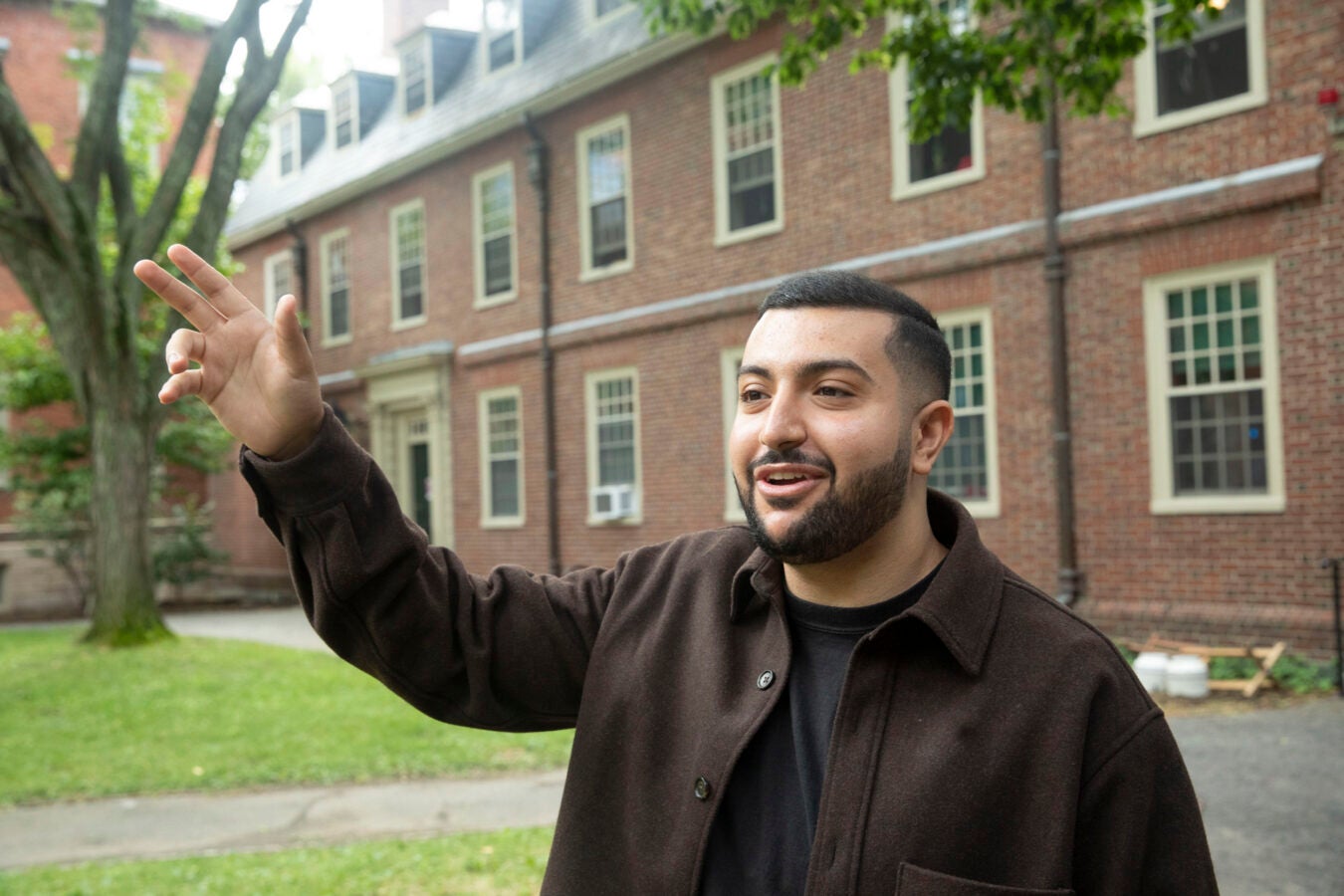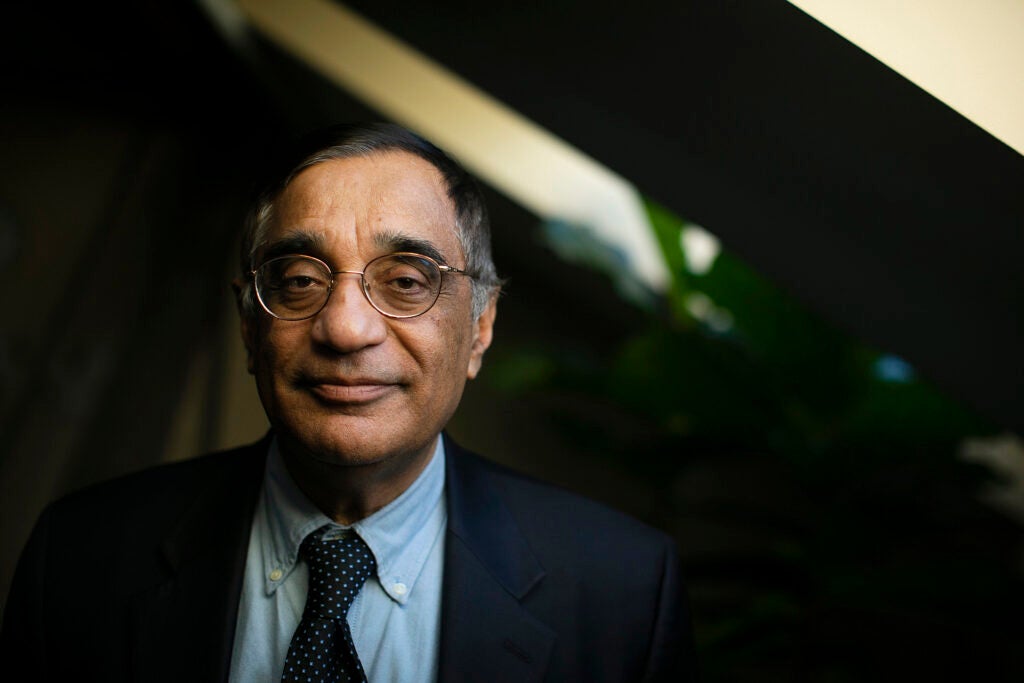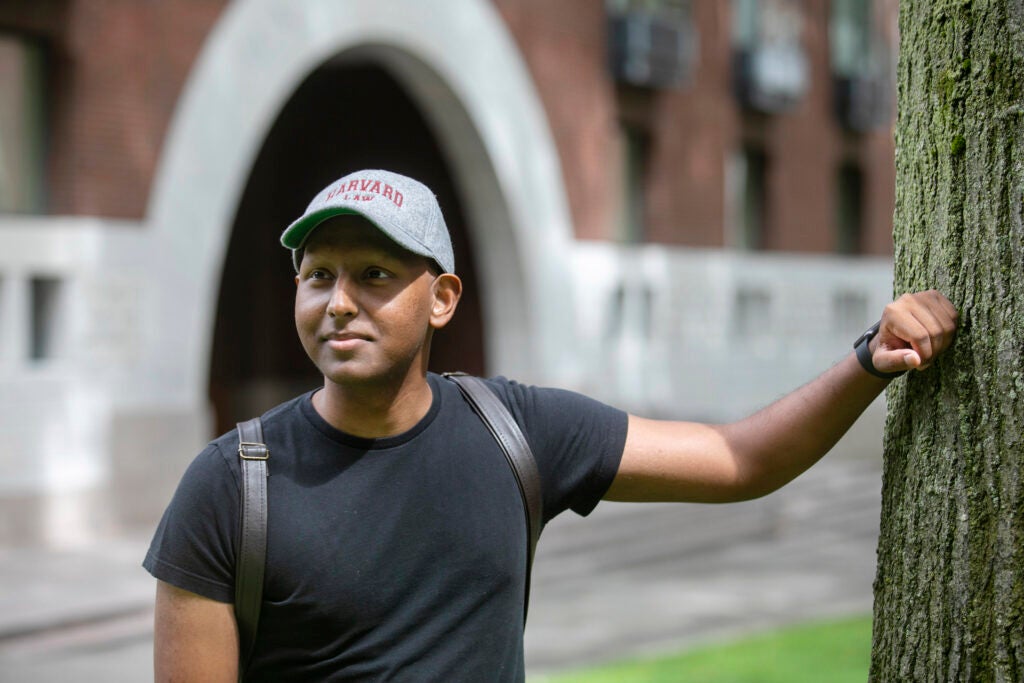By Liz Mineo Harvard Staff Writer
Generation of Muslim Americans who endured rise in post-9/11 bias see solutions in education, political involvement
Of course, Anan Hafez could have no memory of 9/11 — he was 18 months old. But he realized as a child that the day would leave a deep imprint on his life.
A senior from Los Angeles, Hafez remembers being teased and singled out as a kindergartener because of his Muslim religion. His parents were Palestinian refugees raised in Jordan who had made their way to the United States. They told him the answer was to become a sort of young ambassador of Islam, a tactic he would embrace and later shape into more political form.
Hafez is of the generation of Muslim Americans who grew up amid a wave of anti-Muslim sentiment in the aftermath of the attacks orchestrated by the Islamist terrorist group al-Qaida. He remembers hate crimes against Muslim friends: houses spray-painted, car windows broken, women and girls’ hijabs, or headscarves, torn from their heads by strangers. His local mosque built a fence, installed cameras, and hired security guards in response to threats.
“When I was 6 years old, I had to learn the geopolitics of the Middle East and teach people about my religion and the differences among Islam, al-Qaida, Taliban, and ISIS,” said Hafez, who lives in Eliot House. “My dad always told me to portray my religion and my culture with honesty and courage. I had to educate my peers because, for many of them, I was the first Muslim they encountered.”

Twenty years after the attacks, Islamophobia in the U.S. has not gone away. There is more understanding about Islam, but Muslim Americans say they continue to face discrimination and questions about their national loyalty. At the root of the prejudice is a lack of knowledge, said Ali Asani, Murray A. Albertson Professor of Middle Eastern Studies. A religion practiced by 1.6 billion people around the world, Islam is as complex as Christianity or Judaism, each with its diverse interpretations and adherents. “People think all Muslims are the same,” said Asani. “Fear and prejudice about Muslims are based on ignorance about Islam and Muslim cultures.”
Another factor is the resurgence of American nationalism, he said. The “othering” of Muslims since 9/11 has had a long-term impact on the lives of Muslim Americans and their sense of belonging and inclusion in the fabric of American society.
“Both their identities were challenged: their American identity and their Muslim identity,” said Asani, who teaches Indo-Muslim and Islamic Religion and Cultures at Harvard. “I don’t think the country has recovered from making Muslims feel like the other or the enemy, or that Muslims have recovered from the suffering they had to endure after 9/11 because they always have to prove their loyalty to the United States.”

Aleena Ijaz, J.D.’22, who grew up in Falls Church, Virginia, agrees.
“It has been 20 years since the atrocities of 9/11, yet the wound continues to dig deep,” said Ijaz in an email. “It digs into the families that lost loved ones on that ill-fated day. It digs into the national fabric of this country, forever altered by the destruction of our own. It also digs into the lives of Muslim Americans, marked by the scarlet letters imprinted on them by terrorists with whom they shared nothing in common save for one imperfect classification: Muslim.”
Muslim women in particular have been targeted because a number wear the hijab, said Samia Omar, Harvard’s first Muslim woman chaplain. Omar, who had moved from Egypt to New York City in 2000, remembers how her neighbors stopped talking to her the day after the attacks. “After Sept. 11, everything around you made you feel that you didn’t belong here,” said Omar, who was verbally attacked for wearing a hijab.
Omar counsels Muslim female students at Harvard and worries about the heavy burden placed on young adherents to Islam. “It’s been 20 years, since 2001 to 2021, and we still have the same fear and the same concerns,” said Omar.
The United States has made significant strides in two decades, said Asani, but progress is a mixed bag. Universities and colleges have incorporated Islam in their curriculums, and there are more interfaith initiatives to bring together Christians, Jews, and Muslims. Still, many policy think tanks focus on Islam not as a religion but as a security risk. This view is prevalent among some politicians. Former President Trump’s onetime national security adviser Lt. Gen. Michael Flynn referred to Islam as a “political ideology” that “hides behind this notion of being a religion,” and others have echoed that insult.
“A lot of Muslim Americans are much more open about countering Islamophobia, which is our legacy. Our generation, that of young Muslim Americans raised in the shadow of 9/11, was born to take on these issues.”
— Mussab Ali
Asani worries about such organizations because of their influence in policy-making. “They know very little about the faith, the practices, and the ethics behind Islam,” he said. “They’re not really trying to understand the perspectives of Muslims and how they view the world.”
One unexpected outcome of 9/11 fallout has been a rise in Muslim Americans’ interest in electoral politics. Exit polling by the Council on American-Islamic Relations found that the group turned out in record numbers for the 2020 presidential election, with the vast majority backing Joe Biden. In 2018, Ilhan Omar and Rashida Tlaib became the first Muslim women elected to Congress. Only four Muslims have ever served in Congress, the other two being former Representative Keith Ellison of Minnesota, who served from 2007-2019, and Representative André Carson of Indiana, elected in 2008 and now in his seventh term.
Mussab Ali, J.D. ’23, was elected to the Jersey City Board of Education in 2017, the first Muslim ever elected to public office in the city. He says he can point to the moment when he decided to run for office: in 2015, when then-presidential candidate Donald Trump made the false claim that he had seen Muslims in New Jersey cheering when the twin towers came down.
Ali, who had endured taunts in his youth, was a pre-med student in college, but decided instead to go into law and politics to counter Islamophobia and to be a “leading example” of what it means to be Muslim.

“I wanted to represent that Muslims are not some sort of radical fanatics who are trying to overthrow the constitution or take over the government,” said Ali, a board member of the Harvard Muslim Law Students Association. “We’re people who care about helping one another and want to contribute to society.”
He plans to continue using his platform to advocate for policies that ensure equal treatment for Muslim Americans. “For a lot of minorities in this country, it’s a constant struggle,” he said. “There is a constant need in America to have a group that is vilified and treated as ‘the other.’ That is the sad reality of the American experience.”
Hafez, who is concentrating in government with a secondary in economics, has also experienced a call to get involved in politics, as have many of his Muslim friends. It’s a shift from the position of his parents’ generation, most of whom advised their children to keep their heads down, try to fit in, and avoid drawing attention.
“When I was a kid, you didn’t want people to know that you were Muslim,” said Hafez, who was last year’s chair of the John F. Kennedy Jr. Forum at the Institute of Politics, where he is also part of the student leadership group. “Now, it’s not just about fitting in in this country. It’s the time to have the courage to call yourself equal and compatible and proud to be Muslim and American. A lot of Muslim Americans are much more open about countering Islamophobia, which is our legacy. Our generation, that of young Muslim Americans raised in the shadow of 9/11, was born to take on these issues.”
This story was originally published by The Harvard Gazette on September 9 2021

